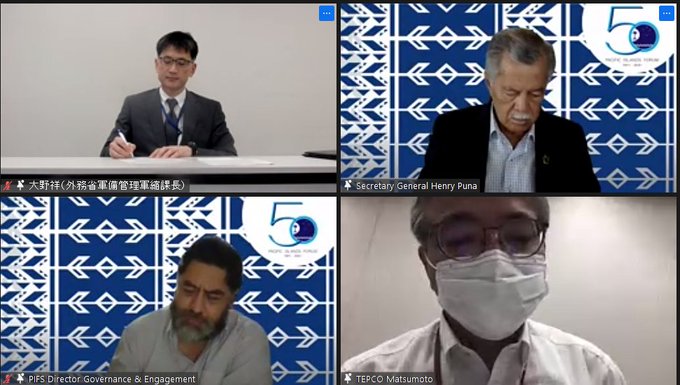Warm Pacific greetings from Suva. I am pleased to welcome you all to this third briefing session with Japan in relation to the ALPS treated water issue.
At the outset, I refer to the important outcomes achieved at PALM9, where Leaders agreed that this matter is a priority for the Pacific and for Japan.
Indeed, this is an issue that requires open and frank consultation, and sustained and continued dialogue both at political and technical levels moving forward.
On 27 July this year Forum Foreign Ministers reiterated the importance of international consultation, international law, and independent and verifiable scientific assessment, as well as our commitment to pursue independent guidance to interpret and verify scientific evidence as they become available.
As we move forward, I encourage us all to remember the range of pertinent issues and concerns we have shared and discussed over the past months. Not least of these is the nuclear testing legacy that we continue to face today, and the lessons that we have learned.
Just two weeks ago, we commemorated International Day against Nuclear Tests, a particularly poignant day for both Japan and our region. The voices of the hibakusha remain in our hearts and we stand by the survivors of Hiroshima and Nagasaki and the struggles they have faced. Likewise, we remember and stand in solidarity with our own people of Bikini and other affected atolls.
As recently highlighted by the Prime Minister of Fiji and Chair of the Pacific Islands Forum, Voreqe Bainimarama, our Pacific nuclear testing legacy continues to pose a clear and present danger to the livelihoods of the peoples of our Blue Pacific.
And as we envision the safe and peaceful world we want to leave for our children, a nuclear-free Blue Pacific must remain our legacy. Indeed, our Treaty of Rarotonga espouses our determination to keep the region free of environmental pollution by radioactive wastes and other radioactive matter.
Against this vital backdrop, Excellencies and Officials, let us not waver in our collective determination and efforts to move forward in a spirit of solidarity and unity in our shared goals.
I thank the government of Japan for providing these latest reports and certainly welcome the opportunity to discuss the contents of these reports with you today.
As we unpack the information, we hope that what we find bridges the information gap on this highly complex and technical issue, and in a way that helps us all to understand the true nature of impacts of the discharge.
More importantly for us in the Blue Pacific, our fears really lie in the transboundary nature of the impacts which is certainly an angle we should pursue in our future endeavours.
We in the Blue Pacific require nothing less than full and complete disclosure of all information and evidence to enable us to fully understand the nature and extent of the impact, and to enable us to make a comprehensive and unbiased assessment of the impacts of the proposed ALPS water discharge.
We are unequivocal about the need for information, and as such, I humbly appeal to the Government of Japan to continue to share the relevant information in its totality, and within agreed timelines.
I am hopeful that through our partnership and ongoing dialogue, we will find ways to address the issues raised by Pacific Island Leaders on this issue, and solutions that are based on science, and consistent with legal and moral obligations.
Notwithstanding, I take this opportunity once again to thank the Government of Japan for the important partnership and the continued dialogue on this most important issue.
SOURCE: PIFS/PACNEWS


















